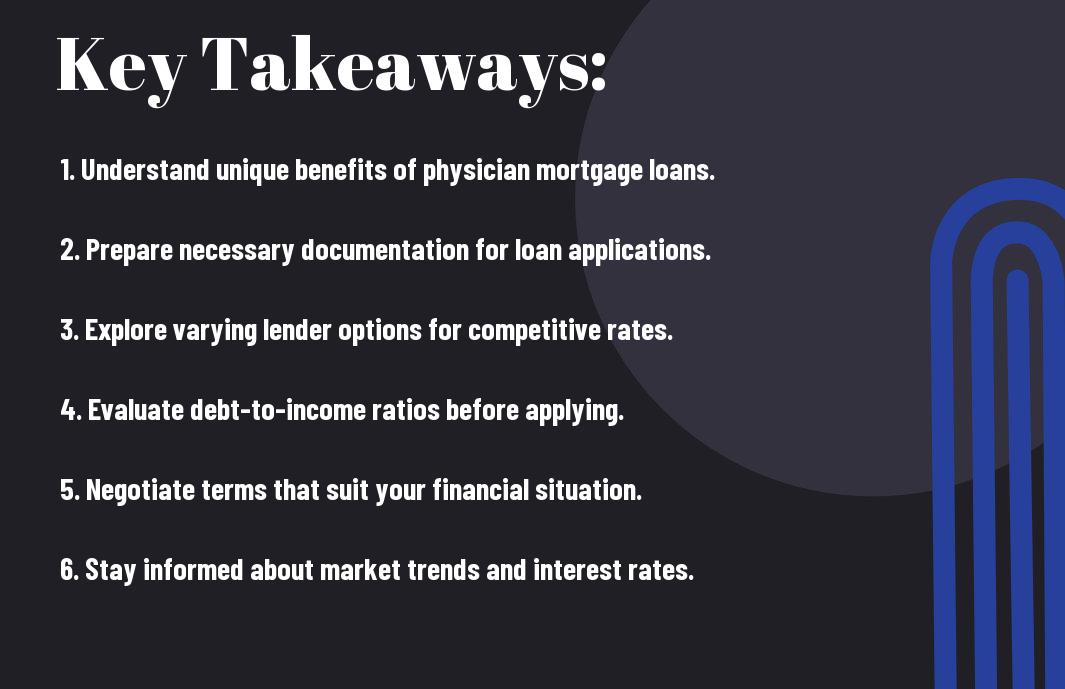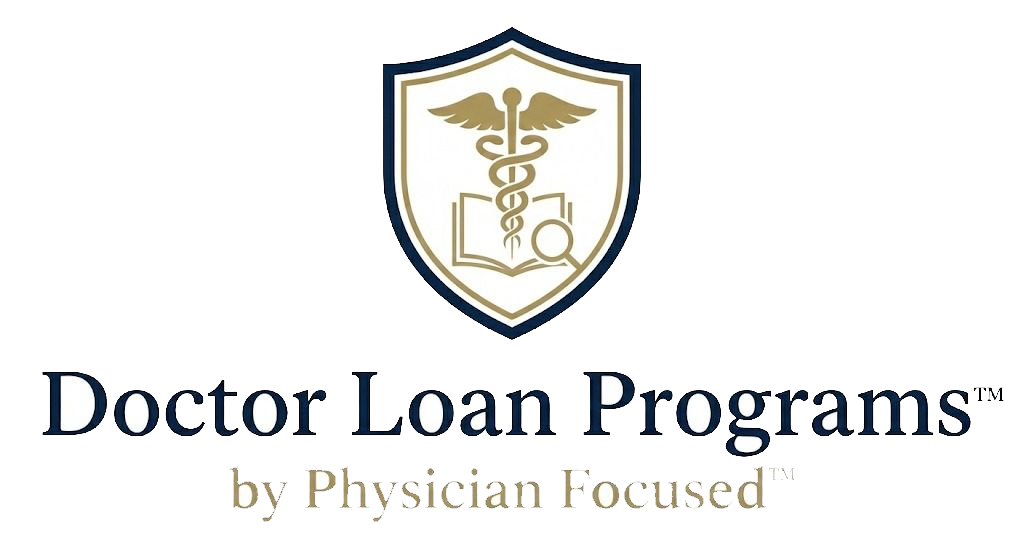Over the course of your medical career, you’ll likely face unique financial challenges, especially when it comes to home financing. Understanding the nuances of doctor mortgage loans can empower you to make informed decisions that will benefit your long-term financial health. In this blog post, you’ll discover vital insights about these specialized loans, including qualifications, benefits, and common pitfalls to avoid. Equip yourself with the knowledge you need to confidently navigate the lending landscape tailored specifically for physicians.
Understanding Doctor Mortgage Loans
While navigating the financial landscape, you may encounter doctor mortgage loans specifically designed to support physicians in their home buying journey. These loans offer unique advantages that can help you secure a home without the typical constraints faced by other borrowers, allowing you to focus more on your medical career and less on financial hurdles.
Definition and Purpose
Purpose of a doctor mortgage loan is to provide a tailored borrowing solution for medical professionals. Unlike conventional loans, these specialized mortgages recognize your earning potential and employment stability, often allowing you to achieve homeownership with little to no down payment requirements and reduced private mortgage insurance (PMI).
Key Features and Benefits
On a doctor mortgage loan, you can benefit from several key features that set them apart from standard mortgage options. These benefits help you maximize your financial capabilities while making your dream of homeownership a reality. Key features include:
- Low or no down payment options
- No private mortgage insurance (PMI) required
- Flexible debt-to-income ratios
- Ability to use future income for qualification
- Special consideration for student loan debt
After exploring these features, you’ll have a better understanding of how this loan type can work for you.
And as you explore deeper into doctor mortgage loans, consider how each feature translates into tangible benefits for your home purchase. This tailored mortgage approach can alleviate some of the financial strain associated with high student debt, making it easier for you to settle into your new home. Additional noteworthy features include:
- Loan amounts suited to high-value properties
- Possible rate lock options for up to 90 days
- Streamlined application process tailored for busy physicians
- Potential for co-borrower options
After evaluating these aspects, you can see how these loans can be advantageous for your unique financial situation.

Eligibility Criteria
Assuming you are a physician seeking a doctor mortgage loan, it’s vital to understand the eligibility criteria that lenders typically require. These criteria often focus on your profession, income, and financial history to determine your suitability for a loan that accommodates your unique circumstances as a medical professional.
Income Requirements
Below the standard requirements for typical home loans, many lenders recognize that your income potential may not reflect your current financial situation. As a physician, your income is expected to stabilize within a short period post-residency, and this anticipated earning can positively influence your loan application.
Credit Score Considerations
One important factor in your doctor mortgage loan application is your credit score, which indicates your financial reliability. Generally, a higher credit score can help secure better loan terms, while a lower score may affect your options.
A solid credit score typically falls between 700 and 740, allowing you to access favorable interest rates. However, unique circumstances surrounding your medical training years may temporarily impact your score. Lenders specializing in doctor mortgages often consider this context, offering flexibility in their requirements. Maintaining timely payments and managing debts will enhance your credit standing, making you more attractive to lenders when applying for a mortgage.
Application Process
Keep in mind that the application process for a doctor mortgage loan is designed to accommodate your unique financial situation, which often includes high educational debt and a promising income. Your lender will guide you through each stage, ensuring you understand the requirements and timelines. This process typically involves filling out detailed forms, providing financial information, and submitting necessary documentation.
Documentation Needed
The documentation needed for a doctor mortgage loan generally includes proof of employment, your medical degree, income verification, and details regarding any existing student loans. Lenders may also request additional financial statements, like bank account statements and tax returns, to assess your financial profile accurately.
Steps to Secure a Loan
At the outset of securing a doctor mortgage loan, you will want to get pre-approved by gathering your financial documents and contacting lenders who specialize in physician loans.
This pre-approval process is vital to understanding how much you can borrow and what your potential interest rates may be. After obtaining pre-approval, you can start shopping for homes within your budget. Once you’ve found a property, submit a formal application along with the required documentation. The lender will conduct an appraisal and finalize the terms of your loan, leading you to closing day when you will sign the paperwork and officially become a homeowner.
Comparing Lenders
After selecting a few potential lenders for your doctor mortgage loan, it’s vital to compare them to find the best fit for your financial situation. Use the following information to evaluate your options effectively:
| Criteria | Considerations |
|---|---|
| Interest Rates | Look for competitive rates that will save you money over the life of your loan. |
| Loan Terms | Evaluate the length of the loan and payment structure that suits your cash flow. |
| Fees | Assess origination fees, closing costs, and any other potential expenses. |
| Customer Service | Research lender reviews to ensure responsive and helpful service. |
What to Look For
An vital aspect of comparing lenders is understanding what features are important for your unique financial needs. Look for lenders who specialize in doctor mortgage loans and those who are willing to offer flexible terms for new physicians. Prioritize lenders who clearly outline all loan conditions, enabling you to make an informed decision tailored to your future income potential.
Questions to Ask
Before finalizing your lender choice, it’s important to ask specific questions that can uncover details about the loan process and manage expectations. Inquire about all fees involved, potential prepayment penalties, and any flexibility in terms should your financial situation change.
Due to the significant investment that a mortgage represents, ensuring you have comprehensive knowledge before committing can save you both time and money. Ask about the lender’s experience with physician loans, the minimum down payment required, and their total loan processing time. Gathering this information can provide reassurance that you are making the right choice for your financial future.
Mortgage Terms and Conditions
Now that you’ve decided to explore a doctor mortgage loan, understanding the mortgage terms and conditions is important. These elements dictate the overall cost of your loan and your financial obligations over time. You’ll encounter various terms, such as loan amounts, down payment requirements, and loan duration, which can vary significantly depending on the lender and your financial situation. Familiarizing yourself with these terms can help you make informed decisions and ultimately find the best mortgage product tailored to your needs.
Interest Rates
Interest rates play a pivotal role in determining your monthly mortgage payment and the total amount you’ll pay over the life of the loan. Depending on your credit score and market conditions, you may have the option of a fixed or adjustable-rate mortgage. A fixed-rate mortgage provides stability, while an adjustable-rate might offer lower initial payments but can fluctuate over time. It’s vital to shop around and compare offers from different lenders to secure the best interest rate available to you.
Repayment Options
Interest in repayment options is significant, especially considering your unique financial situation as a physician. Many lenders provide flexible repayment plans, allowing you to choose a schedule that aligns with your income flow. Common options include standard, graduated, and interest-only repayment plans. Each of these affects your total payment differently, so it’s important to evaluate them carefully.
In fact, some physician mortgage loans offer deferred repayment options that can be particularly advantageous during your residency or fellowship when your income may be lower. These options allow you to start with lower payments and increase them over time as your earnings grow. Understanding these alternatives can help you manage your cash flow more effectively while still investing in your future home.

Common Pitfalls to Avoid
Many physicians may find themselves unwittingly navigating potential pitfalls when obtaining a doctor mortgage loan. Being aware of these challenges can help you secure the best financing and create a sustainable financial plan. From overborrowing to neglecting other financial obligations, understanding these missteps will better position you for long-term success in both your medical career and personal finances.
Overborrowing
For many physicians, the allure of a high borrowing limit can lead to overborrowing. It’s vital to assess your financial situation carefully and take out only what you truly need. Not only can this financial strain affect your quality of life, but it can also limit your ability to save for future goals.
Neglecting Other Financial Obligations
Along with focusing solely on your mortgage, you should consider all of your financial obligations. Overlooking student loans, retirement savings, and day-to-day expenses can lead to a precarious financial situation, even with a sound mortgage plan.
This oversight can have lasting repercussions on your overall financial health. As a physician, you might have substantial student loan debt, and balancing this alongside a new mortgage is vital. Additionally, ignoring retirement savings or emergency funds can impede your financial stability. Ensuring a holistic approach to your financial obligations will help you maintain a balanced budget and secure your financial future.
Final Words
The process of navigating the doctor mortgage loan can be complex, but with the right knowledge and preparation, you can make informed decisions that align with your financial goals. Understanding the unique benefits available to you as a physician will empower you to secure the best loan terms. Take the time to research your options, consult with experts, and weigh the impact on your long-term financial wellness. Your proactive approach in managing your mortgage will ultimately pave the way for a stable and successful financial future.




